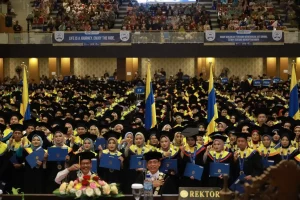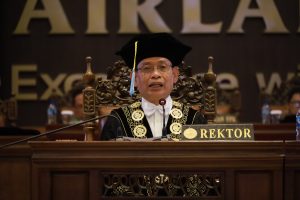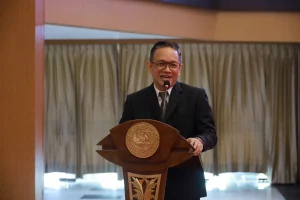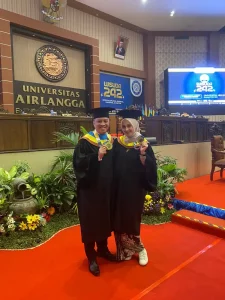Everyone undoubtedly wants a safe and comfortable flight when traveling by airplane. Each airline, of course, also has its standards to provide the best experience to its passengers equally, so they feel comfortable. However, it cannot be denied that disturbances in the form of violations committed by other passengers will disturb comfort. This is the background for the emergence of international and national legal provisions against passengers who do not comply.
To learn more about the legal provisions for non-compliant passengers, the Airlangga Institute of International Law Studies (AIILS) Study Center, Faculty of Law, Universitas Airlangga (FH UNAIR). The webinar, held on Wednesday, December 7, 2022, had the theme “Unruly Passenger and the 2014 Montreal Ratification for Indonesia”. This activity also invited Dhony Vasmin Akhsomo, S.T. (Surabaya Region III Airport Authority Office), Dr. Endang Puji Lestari, S.H., M.H. (Surabaya Region III Airport Authority Office), as well as Adhy Riadhy Arafah, S.H., LL.M. (Adv) (Director of AIILS FH UNAIR) as the speaker.
Dhony Vasmin Akhsomo, S.T., who was lined up as the first speaker, had the opportunity to deliver material from a technical point of view of procedures for handling passengers. He explained that his job as a flight instructor must be in direct contact with other aircraft operation support personnel, so he must have a technical background to support work in the field. In simple terms, he then explained that the term unruly or disruptive passenger is the behavior of passengers who are unable to obey the rules on the plane or do not follow the flight crew’s instructions that it disrupts order and discipline on the aircraft. The regulations regarding unruly passengers are regulated in the provisions of ICAO Annex 6 (Aircraft Operation), ICAO Annex 9 (Facilitation), ICAO Annex 17 (Security), ICAO Circular 288, ICAO Doc 10117, ICAO Doc 10002, Law Number 1 of 2009, Minister of Transportation Regulation Number 61 of 2015, Minister of Transportation Regulation 51 of 2020, and Minister of Transportation Regulation Number 35 of 2021.
The next opportunity was given to Dr. Endang Puji Lestari, S.H., M.H. as the second speaker. He said that the fundamental provisions regarding general aviation were initially regulated in the 1944 Chicago Convention. Indonesia has ratified several international regulations regarding public aviation since 1976. However, the 2014 Montreal Protocol has just been ratified. Efforts to confirm it has been made since 2017 through various activities such as focus group discussions. “So currently, it is actually in the ratification process because there are several clauses that have not been regulated in our law,” he explained.
Submission of material then continued to Adhy Riadhy Arafah, S.H., LL.M. (Adv) as the last speaker. He stated that it was confirmed that Indonesia had ratified the 1963 Tokyo Convention, The Hague Convention of 1970, and the 1971 Montreal Convention through Law Number 2 of 1976. Meanwhile, the 2014 Montreal Protocol had yet to be ratified by Indonesia. The 2014 Montreal Protocol itself is intended to improve and replace the 1963 Tokyo Convention, which still has loopholes. According to him, Indonesia itself is still hindered by several challenges to ratifying the 2014 Montreal Protocol because there is a tendency to avoid lengthy processes in the House of Representatives and make changes to Law Number 1 of 2009 concerning Aviation. According to him, the ratification of the 2014 Montreal Protocol does not have to be in the form of a law; it is enough with a Presidential Regulation with the consideration that the ratification of the 1963 Tokyo Convention at that time had already ratified three conventions in one law at once. In addition, currently, Indonesia already has Law Number 24 of 2000 Concerning International Agreements, which provides guidelines for ratifying international agreements in Articles 10-11.








